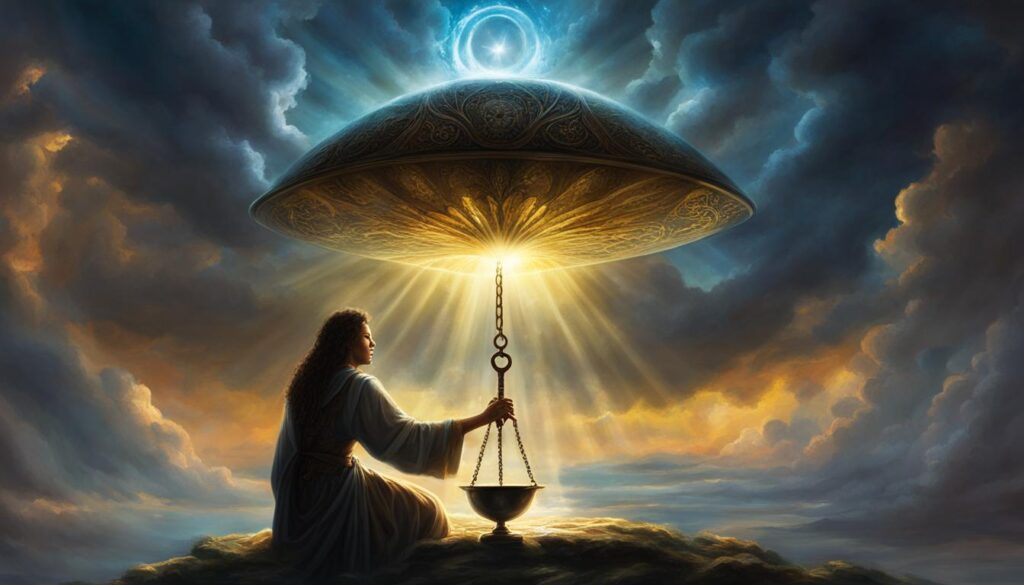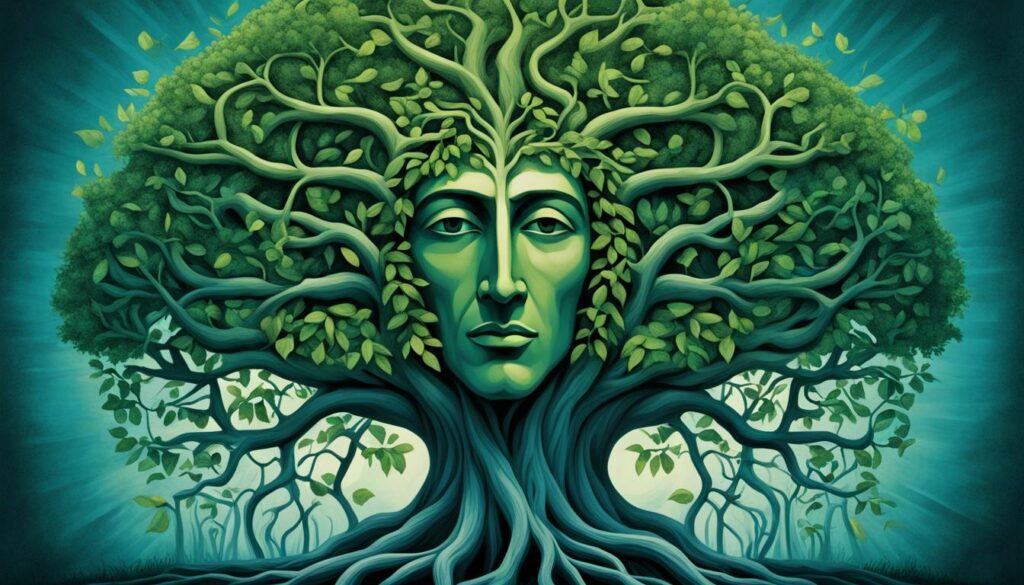Baruch Spinoza, or Spinoza, was a 17th century philosopher born in Amsterdam, Netherlands. He was from a traditional Jewish family and was excommunicated from the synagogue for his philosophical ideas. His masterpiece, “Ethics demonstrated by the geometric method”, explores the nature of ethics and the search for virtue. Spinoza was influenced by philosophers such as Bacon, Hobbes and Descartes, and his pantheistic philosophy challenges traditional conceptions of God and divinity. It promotes ethics based on reason and understanding of nature. The pursuit of happiness is at the center of his ethical philosophy.
Main points presented in this article:
- Spinoza was a 17th century philosopher born in Amsterdam, Netherlands.
- His work “Ethics demonstrated by the geometric method” explores the nature of ethics and the search for virtue.
- Spinoza was influenced by philosophers such as Bacon, Hobbes and Descartes.
- His pantheistic philosophy challenges traditional conceptions of God and divinity.
- A ethics in Spinoza it is based on reason and understanding of nature.
- The pursuit of happiness is at the center of his ethical philosophy.
Spinoza's Life and Influences
Baruch de Spinoza was born in 1632 in Amsterdam, Netherlands, to a Jewish family. From an early age, Spinoza showed great interest in modern philosophy, being influenced by renowned thinkers such as Bacon, Hobbes and Descartes. However, his philosophical ideas came into conflict with the Jewish community, resulting in his excommunication from the synagogue in 1656.
In addition to the influences of modern philosophers, Spinoza was also deeply influenced by ancient and medieval thinkers. He possessed a deep knowledge of the Hebrew Bible, the Talmud and the Jewish Kabbalah, which provided the basis for his philosophical reflections.
Spinoza lived a modest and frugal life, supporting himself as a lens polisher. Despite financial difficulties, he dedicated himself intensely to studying and discussing his philosophical ideas with friends and admirers. His circle of influence was made up of intellectuals, scientists and other philosophers of the time.
Spinoza was born in 1632 in the city of Amsterdam, into a Jewish community. His excommunication from the synagogue, at the age of 24, had a great impact on his life and influenced the development of his philosophical ideas. He devoted himself completely to philosophy after his exile, living a simple life and discussing his ideas with friends and followers.

Philosophical Influences
As Spinoza's philosophical influences were diverse and comprehensive. In addition to the aforementioned Bacon, Hobbes and Descartes, he also studied the works of ancient philosophers such as Aristotle and Epicurus, and medieval philosophers such as Maimonides and Avicenna.
It is important to highlight that Spinoza not only absorbed the ideas of these philosophers, but also reinterpreted them and integrated them into his own philosophical system. These philosophical influences contributed to the formation of his rationalist and naturalistic approach to ethics and philosophy in general.
- Aristotle
- Epicurus
- Maimonides
- Avicenna
The Concept of God in Spinoza
Spinoza's view of God is pantheistic, meaning that he conceives of God as the single, infinite substance that permeates the universe. For Spinoza, God is not a personal and transcendent being, but the entirety of the universe. He argues that God is self-existent and immutable, and that all things are modes of this divine substance. Spinoza describes God as having infinite attributes, but the human mind is only capable of understanding two of them: thought and extension (mental and physical dimensions of the universe).

Spinoza believes that God is the cause of all things and exists necessarily. He maintains that God is the unique and infinite substance that constitutes the essence of the universe, permeating it throughout. For Spinoza, God not only created the universe, but is also the universe itself, immanent and present in everything that exists.
“God, that is, the substance consisting of infinite attributes, each of which explains an eternal and infinite essence, necessarily exists.” – Spinoza
This pantheistic conception of God in Spinoza challenges traditional notions of a personalized and transcendent God, present in conventional religions. For Spinoza, God is beyond anthropomorphic conceptions and is an impersonal and immanent entity, intrinsic to the very essence of the world. He argues that the human mind has limitations and can only understand part of the divine attributes, those related to thought and extension.
| Attributes of God in Spinoza | Human understanding |
|---|---|
| Thought | Ability to understand and reason |
| Outreach | Material and physical dimension of the universe |
Ethics in Spinoza
A ethics in Spinoza it is based on the rational understanding of nature and the universe. For Spinoza, true virtue lies in acting in accordance with the order of nature and avoiding ignorance, as it is ignorance that is the source of evil. In his philosophy, Spinoza criticizes traditional religion, which, according to him, is fueled by fear and superstition. Spinoza defends a rational interpretation of the Bible, emphasizing knowledge of the truth and liberation from harmful passions as paths to true happiness.
For Spinoza, the search for happiness is intrinsically linked to the harmony between mind and body. Living in accordance with nature is finding the balance necessary to achieve true virtue. His rational ethics invites us to understand the order of nature and act in accordance with it, instead of being carried away by harmful passions and desires.
“Happiness is not in fleeting and material pleasures, but in living in harmony with the divine nature.” – Spinoza
Spinoza believes that ignorance is the source of evil and therefore it is essential to seek knowledge and rational understanding to transcend the passions that harm us. His ethics invites us to reflect on our relationship with nature and to seek true virtue through reason and the search for inner harmony.

Virtue and Morality in Spinoza
A virtue in Spinoza it is directly related to morality, as the search for virtue implies acting in accordance with the order of nature and avoiding ignorance. For Spinoza, morality is not dictated by divine laws or external rules, but rather by the rational understanding of nature. To act in accordance with the order of nature is to act virtuously.
Spinoza criticizes the traditional conception of morality based on divine rewards and punishments. Instead, he emphasizes the value of knowing the truth and releasing harmful passions as foundations for authentic morality.
Knowledge of Truth and the Pursuit of Happiness
For Spinoza, knowing the truth is essential to achieving happiness. Knowledge of the truth allows us to understand the divine nature and act in accordance with it. The search for happiness, therefore, is rooted in the search for rational knowledge and understanding the order of nature.
Spinoza challenges the conventional conception of happiness based on material and fleeting pleasures. Instead, he invites us to seek happiness by finding harmony between mind and body and living in accordance with the divine nature.
| Element | Features |
|---|---|
| virtue | Act according to the order of nature and avoid ignorance |
| Morality | Understanding nature through reason and acting accordingly |
| Knowledge of the truth | Understand the divine nature and seek to act in harmony |
| Felicidade | Living in harmony with divine nature and seeking true virtue |
The Relationship between Ethics and Reason in Spinoza
In his ethics, Spinoza places great emphasis on the importance of reason. He argues that true virtue lies in understanding the order of nature through reason and acting in accordance with it. Reason allows us to understand the nature of God and the universe, and rational understanding leads to liberation from harmful passions. Spinoza considers ignorance as the source of evil, and reason as the key to achieving virtue and happiness.
Reason plays a fundamental role in Spinozian ethics, because it is through it that we acquire the knowledge necessary to understand nature and act in accordance with its laws. Through reason, we are able to discern between true and false, right and wrong, and thus make informed ethical decisions.
Spinoza emphasizes that reason should not be subjugated by passions and desires, as they can lead us to act in harmful and irrational ways. Instead, we must use reason to understand our own nature and the nature of the world around us. By acting in accordance with reason, we become freer and more capable of living a virtuous life.
Furthermore, reason helps us overcome ignorance, which Spinoza considers to be the cause of human suffering. Through rational knowledge, we are able to understand the causes of our passions and emotions and, thus, control them appropriately. By understanding the nature of things, we are able to act more wisely and achieve virtue and happiness.
“We follow the path of virtue not because we have learned it, but we learn because we have followed it.”
According to Spinoza, ethics is not just a set of moral rules or religious precepts, but rather a search for a rational understanding of the nature and order of the universe. Reason gives us the ability to understand how the world works and how we should act to achieve virtue and happiness.
Therefore, relationship between ethics and reason in Spinoza is of utmost importance. Through reason, we are able to understand the divine nature and pursue virtue. It is the reason that guides us in the search for truth and allows us to live in harmony with nature and with ourselves.
See below a summary of the main relationships between ethics and reason in Spinozian philosophy:
| Relationship between Ethics and Reason in Spinoza |
|---|
| Reason is fundamental to understanding the order of nature. |
| Reason leads us to liberate harmful passions. |
| Ignorance is the source of evil, and reason is the key to achieving virtue. |
| Reason helps us make informed ethical decisions. |
| Reason frees us from uncontrolled passions and desires. |
| Through reason, we overcome ignorance and achieve happiness. |
“We follow the path of virtue not because we have learned it, but we learn because we have followed it.”

As we can see, the relationship between ethics and reason in Spinoza it is deeply intertwined, and reason plays an essential role in the pursuit of virtue and happiness.
The Relationship between Ethics and Freedom in Spinoza
Spinoza argues that true freedom lies in living according to the order of nature and acting according to reason. He criticizes the idea of freedom as the ability to do what one wants, arguing that this freedom is illusory and based on desires and passions. True freedom, according to Spinoza, lies in understanding the nature of God and the universe and acting in accordance with it, instead of being a slave to passions and selfish desires.
Spinoza believes that freedom is not in the arbitrary will to do what we wish, but in the ability to act in accordance with reason and the divine nature that permeates everything. He argues that passions and selfish desires enslave us, preventing us from achieving true freedom and lasting happiness.
“I do not call him free who is free from desires, but he who is a slave to them.”
Spinoza argues that we need to free ourselves from the bonds of individual passions and desires to truly achieve freedom. This freedom is not only physical, but also mental and spiritual. It is the freedom to understand the truth, to act in accordance with the order of nature and to pursue virtue.
For Spinoza, ethics and freedom are intrinsically linked. Through cultivating reason and understanding divine nature, we can achieve freedom and live in accordance with the order of the universe. By acting ethically, based on reason and understanding of nature, we free ourselves from the constraints of individual passions and desires, thus achieving true freedom.

Spinoza's thoughts on the relationship between ethics and freedom has been influential and remains relevant to this day, challenging conventional notions of freedom and encouraging a more rational and transcendent approach to individual and collective freedom.
The Search for Happiness in Spinoza
Spinoza considers the search for happiness as the search for virtue, which is living in accordance with the order of nature and understanding the truth through reason. For him, happiness is not in fleeting and material pleasures, but in achieving harmony between mind and body and acting in accordance with the divine nature. A search for happiness in Spinoza it is intrinsically linked to the search for virtue and the understanding of truth.
According to Spinoza, true happiness cannot be found in sensual pleasures or material acquisitions. Instead, it lies in the ability to live according to the order of nature and to achieve harmony between mind and body. Happiness is achieved when we are able to understand the truth through reason and act in accordance with it.
“Happiness is not in mere pleasure, but in understanding and acting in accordance with the order of nature.”
For Spinoza, the search for happiness involves the search for virtue. Virtue is achieved when we strive to act in accordance with the divine nature and to avoid being ruled by harmful passions. By understanding the truth through reason and acting accordingly, we find true happiness.
A search for happiness in Spinoza It is a path of self-knowledge and self-realization. By understanding the truth and living according to the order of nature, we become more aligned with our divine essence and find lasting happiness.

The Quest for Virtue
A search for happiness in Spinoza it is closely linked to the search for virtue. Spinoza argues that true virtue lies in acting in accordance with the order of nature and avoiding ignorance, which is the source of evil. He criticizes traditional religion for being fueled by fear and superstition, defending a rational interpretation of the Bible. His ethics emphasize knowledge of truth and liberation from harmful passions.
“True happiness is found in the pursuit of virtue and in understanding the order of nature.”
The search for happiness in Spinoza involves the development of virtue through knowledge of the truth and acting in accordance with the order of nature. It is a path of spiritual growth and self-realization, through which we find lasting happiness and harmony with the universe.
The Relevance of Spinoza's Ethics in Modern Philosophy
Spinoza's ethics continues to be relevant in modern philosophy for its rational and naturalistic approach to morality. His emphasis on understanding the order of nature and the pursuit of virtue resonates with many contemporary philosophers. Spinoza challenged traditional conceptions of God and divinity, and his pantheistic views influenced later thinkers. His rational ethics and his search for happiness through understanding the truth are relevant themes for modern moral philosophy.
Criticisms and Controversies Surrounding Spinoza's Ethics
Spinoza's ethics faced criticism and controversy in his time and continue to be debated today. His pantheistic view of God and his rational interpretation of the Bible challenged conventional religious structures and led to his excommunication from the Jewish community. Spinoza was considered a heretic by many, but his ideas also inspired other philosophers and thinkers who saw the value in his naturalistic and rational approach to morality.
“Criticism arose mainly due to his view of God as the only substance in the universe, denying the existence of a personal and transcendent God. This was considered an affront to established religious beliefs and sparked controversy with the religious authorities of the time.”
By challenging traditional conceptions of divinity and ethics, Spinoza's ideas provoked negative reactions and controversy among those who clung to established belief systems. However, some contemporary philosophers and thinkers have recognized the value of his naturalistic and rational approach to morality.
Criticisms of Spinoza's Ethics
- Some critics argue that Spinoza's ethics are excessively rationalistic, leaving little room for emotional and intuitive considerations.
- Others question the idea that the quest to understand divine nature can lead to truth and happiness, arguing that the human experience is too complex to be reduced to reason alone.
- There is also criticism of Spinoza's interpretation of the Bible, considering that his rationalist approach may neglect symbolic and spiritual aspects present in sacred texts.
Controversies about Spinoza's Ethics
Spinoza's excommunication from the Jewish community and criticism of his philosophy generated controversies and debates that continue to this day. Some of the controversial topics involve:
- The relationship between Spinoza's ethics and religion, with some interpretations arguing that his philosophy is incompatible with established religious traditions.
- The nature of free will in Spinoza's ethics, which challenges traditional conceptions of freedom and autonomy.
- The validity and applicability of Spinozist ethics in modern times, considering the evolution of society and science.
Despite criticism and controversy, Spinoza's ethics continues to be an object of study and reflection, influencing contemporary philosophers, theologians and thinkers. His challenging ideas and his naturalistic and rational approach to morality continue to raise debates and questions in search of a broader understanding of ethics and human existence.
| Criticisms of Spinoza's Ethics | Controversies about Spinoza's Ethics |
|---|---|
| Excessive rationalism | Relationship between ethics and religion |
| Little space for emotional and intuitive considerations | The nature of free will |
| Rationalist interpretation of the Bible | Validity and applicability of Spinozist ethics in modern times |
Influence of Spinoza's Ethics on Later Thinkers
Spinoza's ethics had a significant influence on later thinkers, leaving its mark on philosophy and theology. One of the notable thinkers influenced by Spinoza was Albert Einstein, who referred to God in Spinozist terms. Spinoza's approach, which combined naturalism, rationality and pantheism, continues to be an important reference in these areas.
Spinoza challenged conventional conceptions of divinity and the nature of reality, offering a unique and provocative perspective. His pantheistic view of God as the single, infinite substance that permeates the universe questioned the idea of a personal, transcendent God. Instead, he conceived of God as the entirety of the universe.
Spinoza invited us to rethink our understanding of the world and our relationship with it.
By challenging traditional conceptions, Spinoza influenced the way many later thinkers explored philosophical and theological questions. His naturalistic and rational approach to morality provided a solid basis for reflection and debate in a variety of fields.
Thinkers influenced by Spinoza
Several notable thinkers were influenced by Spinoza's ethics. In addition to Albert Einstein, some of these thinkers include:
- Friedrich Nietzsche
- Benedetto Croce
- Gilles Deleuze
- Arthur Schopenhauer
- isaiah berlin
Each of these philosophers found inspiration in Spinoza's ideas and incorporated these concepts into their own work. Spinoza's influence continues to be a source of inspiration for those seeking to understand the nature of reality, morality, and human existence.

Conclusion
Spinoza's ethics offers a rational and naturalistic approach to morality, emphasizing the importance of understanding divine nature and pursuing virtue. His pantheistic view of God challenges traditional conceptions of divinity and his quest for happiness through understanding the truth continues to provoke philosophical thought. Spinoza's ethics is a meaningful approach to the pursuit of virtue and happiness in modern life.
Spinoza, in his masterpiece “Ethics demonstrated by the geometric method”, argues that acting in accordance with the order of nature and avoiding ignorance are essential to achieving virtue. He criticizes traditional religion for being based on fear and superstition, defending a rational interpretation of the Bible.
In his ethics, reason plays a fundamental role. Through rational understanding, we are able to understand the nature of God and the universe, and this leads to liberation from harmful passions. Furthermore, Spinoza emphasizes the importance of living according to the order of nature and seeking harmony between mind and body to achieve true and lasting happiness.
FAQ
Q: What is Spinoza's ethics?
A: Spinoza's ethics is a philosophical approach that explores the nature of ethics and the pursuit of virtue. It is based on the rational understanding of nature and the universe, promoting the search for harmony between mind and body.
Q: What are Spinoza's philosophical influences?
A: Spinoza was influenced by philosophers such as Bacon, Hobbes and Descartes, as well as having a deep understanding of the Hebrew Bible, Talmud and Jewish Kabbalah.
Q: How does Spinoza conceive of God in his philosophy?
A: Spinoza conceives of God as the unique and infinite substance that permeates the universe, with God being the entirety of the universe. He argues that God is self-existent and immutable, and all things are modes of this divine substance.
Q: What is the role of reason in Spinoza's ethics?
A: Spinoza places great emphasis on the importance of reason in his ethics. For him, true virtue lies in understanding the order of nature through reason and acting in accordance with it. Reason allows us to understand the nature of God and the universe, leading us to liberate ourselves from harmful passions.
Q: How does Spinoza relate ethics and freedom in his philosophy?
A: Spinoza argues that true freedom lies in living according to the order of nature and acting according to reason. He criticizes the idea of freedom as the ability to do what one wants, arguing that true freedom lies in understanding the divine nature and acting in accordance with it.
Q: What is the main quest in Spinoza?
A: Spinoza considers the search for happiness as the search for virtue, which is living in accordance with the order of nature and understanding truth through reason. For him, happiness lies in achieving harmony between mind and body and acting in accordance with divine nature.
Q: What is the relevance of Spinoza's ethics in modern philosophy?
A: Spinoza's ethics continues to be relevant in modern philosophy for its rational and naturalistic approach to morality. His emphasis on understanding the order of nature and the pursuit of virtue resonates with many contemporary philosophers. Spinoza challenges traditional conceptions of God and divinity, influencing later thinkers.
Q: What were the criticisms and controversies surrounding Spinoza's ethics?
A: Spinoza's ethics faced criticism and controversy in his time for his pantheistic view of God and his rational interpretation of the Bible. These ideas challenged conventional religious structures, leading to his excommunication from the Jewish community.
Q: Which thinkers were influenced by Spinoza's ethics?
A: Spinoza's ethics influenced later thinkers such as Albert Einstein, who referred to God in Spinozist terms. His naturalistic, rational and pantheistic approach to morality continues to be a reference in philosophy and theology.







